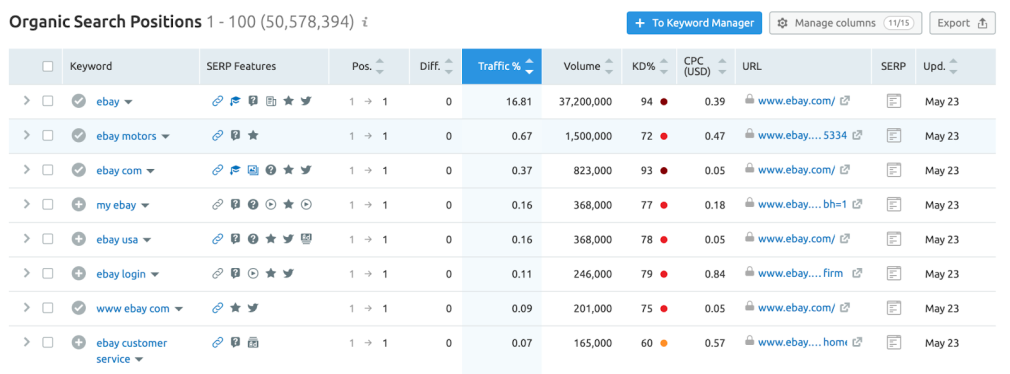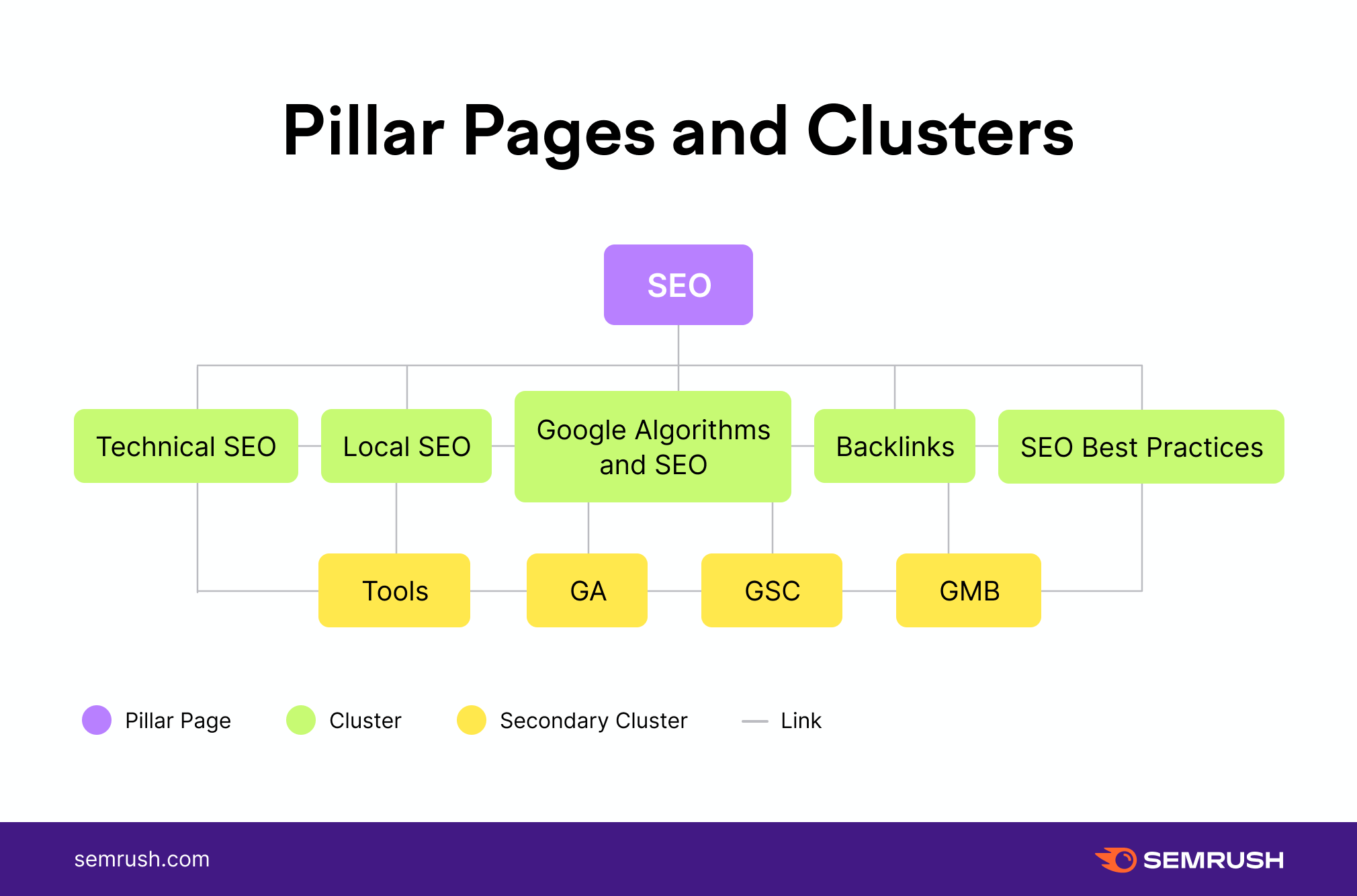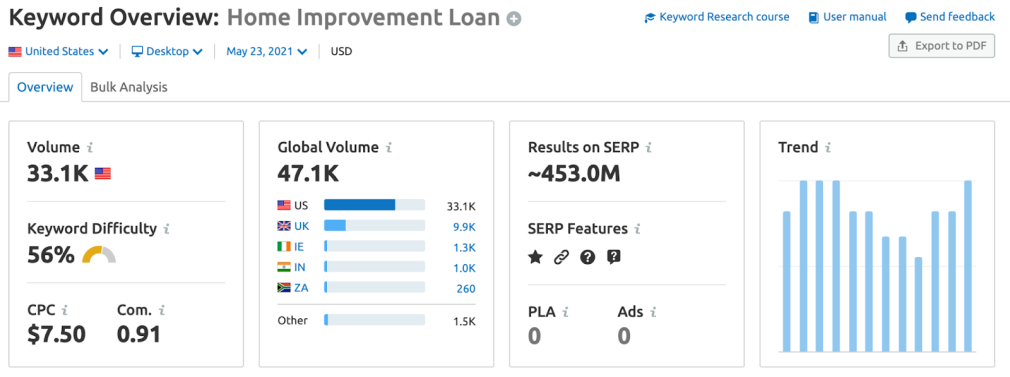Keyword research on its own isn't enough to rank your website on the SERPs for the queries that people are searching to find businesses just like yours.
It's how you use the keywords you find during this research that drives the growth.
This is what's known as a keyword strategy. In this guide, we're going to take a deep dive into what this is, why you need one, and how to get the basics right. Specifically, we're going to take a look at:
What Is a Keyword Strategy? Why Do You Need a Keyword Strategy? How To Develop a Solid Keyword Strategy for SEO Benchmark Your Current Performance Set Goals and KPIs Think Topics Over Keywords Using Search Volume Relevance and Conversion Opportunity Using Competitor Analysis Analyzing Keyword Difficulty Putting In Place Priorities Tracking, Reporting, and AnalysisWhat Is a Keyword Strategy?
So, what is a keyword strategy?
It's the overall approach that supports your larger SEO strategy and can help you determine the keywords that you should be targeting. While it's easy to brush this off as the same thing as keyword research, it's not.Why Do You Need a Keyword Strategy?
Keyword research alone gives you little more than a list of keywords. Sure, you've likely qualified these by search volume, keyword difficulty, and relevancy (at least). Still, the outcome of this process is just a list.
Do keyword research alongside a solid keyword strategy, though, and you suddenly add context to this list, and you're able to do things like:
Ensure that you're driving relevant traffic that has the potential to convert Identify quick-win opportunities Prioritize SEO tactics Set expectations around rankings and visibility growth Feed keyword research into your content strategy Structure your content into topic clusters Effectively measure the impact of your effortsIt's all about figuring out the what and why behind your keyword targeting decisions, the what being the target keywords, and why the traffic that they can drive would add value to your business.
A keyword strategy should define what you need your website to rank on the SERPs for and why.
You need to know where you're going to be able to figure out how to get there. Having a keyword strategy means you can choose the right tactics that can help you drive traffic from these search queries.
How To Develop a Solid Keyword Strategy for SEO
Let's look at how you can develop a solid keyword strategy for SEO, breaking down the main steps you should take to give direction and make sure you're considering the right things.
But what we're not going to do here is teach you how to do keyword research. If you're looking to learn how to do this, we recommend that you take our keyword research course or check out the resources below:
How to Use Semrush for Keyword Research How to Do Keyword Research for SEO: A Simple Step-by-Step Guide 12 Best Keyword Research ToolsWe're going to look at the steps you need to take to build a keyword strategy that helps you determine what keywords your site needs to rank for and why they're the right search queries to be targeting.
Benchmark Your Current Performance
We've already stated the importance of knowing where you're going to figure out how to get there. But, you need to know where you're at now, too.
It makes sense to start the development of your keyword strategy by benchmarking your current performance.
Use the Semrush Organic Research Tool's positions report to see the keywords your site currently ranks for.

It's a quick and easy way to benchmark your current rankings and get a broad insight into your performance on the SERPs.
You should also pay attention to the organic keywords trend to benchmark the breakdown of keywords ranking in different position groups. You'll use this data further into the process to identify quick-win opportunities.

Or, to benchmark your performance on a list of keywords that you've already pulled together, you can use the Semrush Position Tracking Tool.

What's important here is that you understand your starting point to use these insights when prioritizing your focus.
Set Goals and KPIs
Just as with any strategy, you must be effectively setting goals and KPIs at this stage.
After all, you need to be able to measure progress. Setting clear goals means you're in a stronger position to see how far you are away from these by tracking relevant KPIs.
Take a read of our guide on 12 Important SEO KPIs You Should Track to learn more about putting these in place at a wider level, but when it comes to putting in place specific goals and performance indicators for a keyword strategy, consider using:
Keyword rankings. While there are many differing opinions in the SEO community around whether or not rankings should be reported on, they're essential in the context of a keyword strategy. Keyword footprint. Tracking the number of keywords that your site is indexed for can be a strong indicator that you're increasing your site's organic visibility. Organic keywords trend. Tracking the number of keywords showing in each group of positions can help to demonstrate growth and progress. For example, setting goals or tracking KPIs around increasing the number of keywords in the Top 3 and 4-10 groups can help scope your strategy.Think Topics Over Keywords
Long gone are the days of optimizing web pages for single keywords, and in 2021 you need to be thinking about how to optimize for topics instead.
Using topic clusters can be a really effective way to do this, and thinking about how to structure your content in this way when putting together a strategy makes it easier to group keywords.

At this stage, you need to consider how your keyword strategy helps to build topical authority. That's establishing your site as an expert in your field by creating content that covers a topic in depth.
Mapping out topic clusters means you can group keywords within your strategy to prioritize and understand how different keywords relate to each other. It's also an effective way to start mapping keywords to pages to avoid keyword cannibalization.
Using Search Volume
A keyword strategy should be about so much more than just search volume. However, it's a metric that you cannot ignore.
At the end of the day, ranking for a keyword (or topic) is only going to bring value to your business if people are actually searching for it.
Just don't obsess over it; there are other things to consider alongside it.
Yes, high volume keywords should be part of your strategy. Of course, they should. But searcher intent is important, too. You need to know how a searcher who lands on your page could become a customer of yours, either now or in the future.
You can find the monthly search volume for keywords using the Semrush Keyword Overview and Keyword Magic tools.

Relevance and Conversion Opportunity
One thing you need to establish is the topics that you want to drive traffic for.
We've already mentioned the importance of building topical authority to rank at the top of the SERPs. We already know that Google wants to return the most relevant results from authoritative experts.
Keeping that in mind, it's important to think about how relevant the traffic that your target keywords could drive to your business.
Ask yourself how a keyword fits into your commercial objectives, both now and in the future. But that doesn't mean you should dismiss informational queries.
Every business has a sales funnel, and your prospects will enter this either at the top, middle, or bottom (you can learn more about sales funnels here). Top-of-the-funnel drives higher volumes at a lower intent to purchase or convert, whereas the bottom-of-the-funnel typically sends lower traffic volumes at a higher intent.
The best strategies target keywords right across the funnel, ensuring their SEO efforts drive traffic at every stage.
Using Competitor Analysis
While competitor analysis is important during the keyword research stage, it's also a core part of keyword strategy development.
Using the Semrush Keyword Gap tool to understand the keyword overlap between your own domain and your main competitors can help you identify opportunities.

It's all about understanding the competitive landscape, keeping an eye on it, and using these insights to shape your own strategy.
Analyzing Keyword Difficulty
How difficult is it going to be to rank for the keywords that you're targeting?
You must be considering this if only to ensure that you're putting together a strategy that delivers month-to-month growth.
Ranking for difficult keywords takes time. But by considering the keyword difficulty of the terms you want to target, you're able to mix in lower difficulty, medium difficulty, and higher difficulty keywords, helping to show growth as quickly as possible and compound organic traffic.
You can run a keyword analysis through the Keyword Overview Tool to see the Semrush Keyword Difficulty Score.

This score is a percentage from 0 to 100, and the higher the percentage, the more difficult Semrush predicts it would be to rank for. This is calculated by considering the authority and backlink profiles of the domains that are ranking in the top 10 SERPs, as well as information about the keyword itself, including the type of keyword, search intent, search volume, and SERP features. The metric uses this data to estimate how hard it would be for a new website to outrank its current URLs.
Putting In Place Priorities
It's time to prioritize your keywords and develop your strategy, and it helps to understand what your short-term, mid-term, and long-term ranking goals are.
At this stage, you should already have collected insights around search volumes, keyword difficulty, relevance, and conversion opportunity. From there, you'll begin grouping them into their relevant buckets.
Ask yourself the following questions to help put priorities in place:
How does the website currently perform for these keywords? Are there quick-win opportunities to push page 2 rankings to page 1 by improving and updating content? How difficult is it going to be to rank? How relevant are these keywords to the business? And what stage of the funnel are they targeting? Is there an opportunity to target keywords that competitors are ignoring? How do these keywords align with the goals of our strategy? Can we easily group these keywords into topics?The way one business prioritizes keywords is going to be different from how another approaches this. Still, by asking yourself the right questions, you're putting yourself in the perfect position to align your keyword strategy with your wider business goals.
Tracking, Reporting, and Analysis
Don't forget the importance of tracking progress against your goals and reporting on it.
It's OK for a strategy to be fluid and for the tactics you use to change part of the way through. That's natural and often what sets apart an average strategy from a great strategy.
Checking in at least monthly on your KPIs means you're always in the know about how close you are toward achieving your goals, can share updates with other stakeholders within a business, and can have the confidence that things are moving in the right direction.
Don't underestimate the importance of putting in place a solid keyword strategy.
Many businesses stop at keyword research, but by going one step further and building a strategy, you'll know exactly what keywords you should be targeting and how and why they're going to add value to your business.
It's all about proper planning, and those who invest the time and resources into this are usually the ones who win.Innovative SEO services
SEO is a patience game; no secret there. We`ll work with you to develop a Search strategy focused on producing increased traffic rankings in as early as 3-months.
A proven Allinclusive. SEO services for measuring, executing, and optimizing for Search Engine success. We say what we do and do what we say.
Our company as Semrush Agency Partner has designed a search engine optimization service that is both ethical and result-driven. We use the latest tools, strategies, and trends to help you move up in the search engines for the right keywords to get noticed by the right audience.
Today, you can schedule a Discovery call with us about your company needs.
Source:





![How to Find Low-Competition Keywords with Semrush [Super Easy]](https://allinclusive.agency/uploads/images/how-to-find-low-competition-keywords-with-semrush-super-easy.svg)